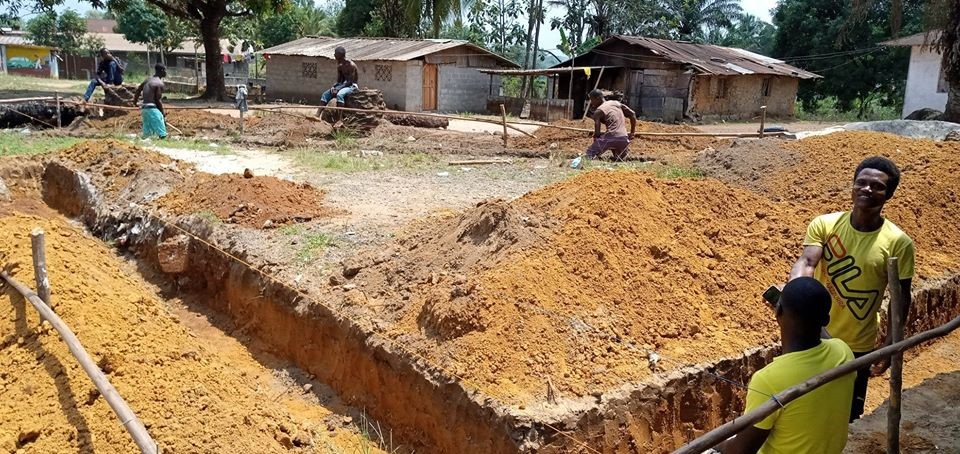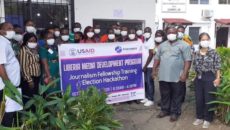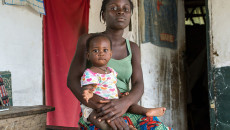BUCHANAN, Grand Bassa – A community radio station in Buchanan, Magic FM, has begun constructing a community resource center in Buchanan to help it become more financially sustainable. The center will comprise of a multipurpose conference hall, office space, and well-furnished self-contained bedrooms that will be rented out to the public.
The station manager, Christopher Yarwoe, said the construction of the facility will cost a little more than US$15,000 and will be used to generate additional income as a long-term sustainability plan for the operations of the station.
Community radio stations became popular in Liberia at the end of the country’s last civil war in 2003, when the international NGO, Mercy Corps, under its peace-building initiative ‘Diompilor’ (a phrase in the Kissi dialect meaning “onenessâ€) began setting up community radio stations to broadcast peace messages in the local languages.
Since then, new community radio stations have continued to emerge. There are currently more than 50 community radio stations registered with the Press Union of Liberia and the Association of Liberia Community Radios, ALICOR. Most of these stations have benefitted from capacity building training for staff through partnerships with local and internal NGOs, such as Mercy Corps, Talking Drum Studio, Liberia Media Center, Radio Netherlands Training Center, IREX and Internews.
However, financial sustainability remains a major challenge for them, as partnership support has dwindled over the years. Most of them now survive at the mercy of telecommunications companies, which provide them with a tower and electricity in exchange for publicity.
In some counties, officials allot money to community radio stations from the County Social Development Funds, while others do not. But for even counties that make allotments to community radios, that cannot cover operations costs, especially the cost of electricity and salaries for staff.
In announcing the plan to become more sustainable, Yarwoe said no community radio station in the country will survive without a sustainability plan.
“Fair enough, it will die perpetual death or natural death, meaning that, it will go off the air and it wouldn’t come on,†he said.
“It is something that we understand has been a challenge for every radio station across the country. Many of our colleagues, I believe, also have the same thinking that they have to put some plan in place to sustain the radio.â€
He said the amount needed for the construction of the resource center would be generated from donations and contributions of community members. He added that citizens and friends residing outside are also expected to contribute to the project.
“So, when the project is done, we are going to have four rooms self-contained upstairs to be used as [a] guest house. That self-contained facility will be used to raise some revenues in a month’s time to pay our staff and run the station smoothly,†he said.
“Years back, our challenges have been electricity, rental problem, fuel, generator, and maintenance. Those were challenges that we were always trying to overcome. We needed to build the capacity of young people who have [an] interest in journalism. So, you have the vision and the mind to move the vehicle, but also have existing challenges to deal with.â€
He believes that most of the challenges faced by community radio stations can be overcome only through the innovation of their managers.
“Most of the money that comes to the radio station [are] mainly from announcements, requests, and advertisement and sometimes from religious programs. Maybe at times from extended programs based on the manager’s capacity to lobby, which is very insufficient to run the station. So, as a result, we all give our staff stipend, not a salary,†he added.
Yarwoe revealed that community radio stations are also surviving by donations and contributions from community members, NGOs, and humanitarians; but he said those contributions are not stable. He called on media owners across the country to be creative by employing strategies that will help to maintain their stations in the absence of these donations.
He lauded the contributions of community members and partners for their continuous support to community radio stations across the country.
“We recognized that and we want to encourage them to keep that because they are helping the communities especially during such a crisis, the Coronavirus. Have we not have the electricity, how were we going to provide education and carry out awareness about the Coronavirus?†he said.
He called on organizations, including national and international to support his station’s ongoing effort.
Featured photo courtesy of Christopher Yarwoe



